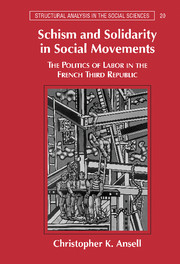Book contents
- Frontmatter
- Contents
- Acknowledgments
- 1 The Struggle and the Conciliation
- 2 Schism and Solidarity
- 3 Vox Pouli, Vox Dei
- 4 Esprit de Corps
- 5 Organizing the Fourth Estate
- 6 The New Covenant
- 7 “Above All We Are Syndicalists”
- 8 From Congregation to Reformed Church
- 9 Dealignment
- 10 The Party the Syndicalists Built
- 11 Conclusion
- Works Cited
- Index
11 - Conclusion
Published online by Cambridge University Press: 21 July 2009
- Frontmatter
- Contents
- Acknowledgments
- 1 The Struggle and the Conciliation
- 2 Schism and Solidarity
- 3 Vox Pouli, Vox Dei
- 4 Esprit de Corps
- 5 Organizing the Fourth Estate
- 6 The New Covenant
- 7 “Above All We Are Syndicalists”
- 8 From Congregation to Reformed Church
- 9 Dealignment
- 10 The Party the Syndicalists Built
- 11 Conclusion
- Works Cited
- Index
Summary
“I want unity with rage, with passion,” pleaded the grandson of Karl Marx, Jean Longuet, at the 1920 Socialist party congress (Kriegel 1964b, 232). Yet the balance of passion that day rested with the wings of the party rather than its center. Schism prevailed. A major goal of this book has been to develop an analytical framework for understanding the processes of schism and solidarity in organizations and social movements. Why do some organizations and groups have a tendency toward schism? Why do schismatic organizations sometimes set aside their grievances in the name of unity? During the fifty years of organizational history examined in this book, the labor movement went through several phases of schism and solidarity. Toward the end of the 1870s, it attempted to unite. But a series of schisms in the early 1880s left the movement extremely fragmented. It remained that way through the 1880s and early 1890s. But then a reorganization began. By 1906 the labor movement was finally united. Then, in 1920–1, it broke up again into rival ideological blocs. Thus, a phase of schism, followed by a period of solidarity, culminating in a return to schism.
The book has argued that certain types of groups are prone to schism: groups held together by a sense of common identity, especially those who feel themselves to be part of the same community or the same status group. In France, for example, workers often felt themselves to be a status group with a distinctive style of life. But you could say the same thing about many groups (e.g., nuclear families, Cuban-Americans, gays, Germans, antinuclear activists, Catholics).
- Type
- Chapter
- Information
- Schism and Solidarity in Social MovementsThe Politics of Labor in the French Third Republic, pp. 228 - 244Publisher: Cambridge University PressPrint publication year: 2001



